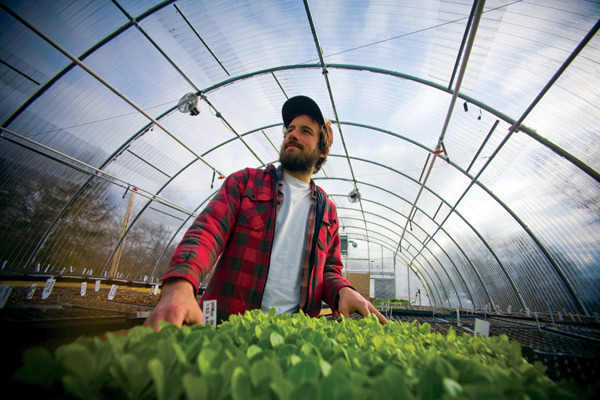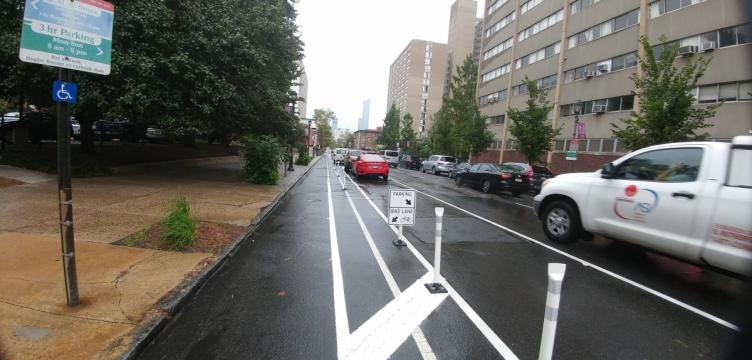 by Lee Stabert | photo by Jessica KourkounisNic Esposito and a new generation of urban activists are starting in the garden
by Lee Stabert | photo by Jessica KourkounisNic Esposito and a new generation of urban activists are starting in the garden
Answering a question about his favorite things to grow is a challenge for Nic Esposito. After a few nods to his Italian heritage—eggplants, tomatoes—he settles on a response that speaks volumes about the work he is doing in his West Philadelphia community: “I love planting perennials,” he says with a smile. “It might make me sound lazy, but I love the idea of putting something in the ground—like rosemary or berry bushes—and seeing them grow back. It gives you a stake in where you are.”
If you’re searching for an indication of where the sustainability movement is headed next, look no further than Esposito—flannel shirt, beard, muddy boots and all. The new urban activists are here, and they’re getting their hands dirty. Literally.
A generational shift is underway, and it’s starting in the garden. This new crop of community leaders share the passion and mission of their forebears while embracing an exciting breed of pragmatism and socially-responsible entrepreneurship. They realize that creating a progressive future for our urban centers means making sustainable sense, but also economic sense. They still want to organize, educate and recycle, but they also want to grow things—viable markets, civic connections and, of course, food.
Esposito—a community gardener and innovative urban agriculture advocate—is by no means the only young Philadelphian working on the ground to revolutionize life in our city, but he is an excellent case study. Deeply devoted to his West Philly neighborhood and expansive in his vision for a more verdant and connected future, Esposito makes a compelling case for gardening and urban agriculture as the keys to unlocking a better way of life.
Esposito grew up in South Jersey, but his family’s roots are in Italian South Philadelphia. He had a conventional suburban upbringing—food came from the grocery store—but credits his politically progressive parents with giving him an open mind. “I was always in the outdoors,” he recalls. “I’m a writer, so I spent a lot of time writing poems in the woods.”
After graduating with a degree in English from Rowan University, Esposito spent a few years as a nomad. From the get-go, he knew he wanted to do service. After turning down a Peace Corps commission, he signed up with AmeriCorps and spent 10 months in the NCCC (National Civilian Community Corps). Placed on a team based in California, he spent those months traveling around the country—mostly to hurricane-ravaged areas on the Gulf Coast. “Everywhere we went had a farm,” he says. “It was this serendipitous thing. Everywhere I ended up, I was able to volunteer on a farm.” His final project for NCCC would be transformative—Esposito’s team was sent to Danny Woo International District Community Garden in Seattle. It was his first experience with community gardening.
“I guess there’s power in being an English major,” says Esposito. “I had great research skills. I started reading as many books as I could and went to a million workshops. I WWOOFed [an international network of organic farms offering room and board in exchange for labor] in Bolivia and Argentina, and eventually ended up at EarthShare Gardens in Lafayette, LA.”
Esposito recalls one afternoon in particular, sitting with friends in the Louisiana sun, packing CSA shares and chatting about everything from farming to philosophy. “I hadn’t felt that content in a long time,” he says. “After college, we all kind of run around, trying to figure out who we’re going to be, and where we’re gonna work. Farming melds the two parts of my personality; I want to work hard and I want to be part of something bigger than myself. The first time I grew something and ate it, I was hooked.”
Around Christmas 2008, Esposito’s grandfather grew ill. He moved back to the area to be closer to his family, but also to tackle a long-term challenge. “You learn a lot traveling around,” he says. “But to do a real, sustainable project, you have to have a home base. Louisiana wasn’t the place for me—plus, there’s just something about Philadelphia.” [
He answered a Craigslist ad and moved into a house in West Philadelphia with raised beds in the backyard. His new roomates introduced him to Erica Smith, a relationship that would prove essential.
His housemates had bought worms from Smith for composting, and heard she was working to establish a community gardening association in West Philly. Once Esposito and Smith hooked up, that project became the UC Green Gardening Association. “That was the beginning,” says Esposito. “From there, we scoured West Philadelphia looking for land.”
Smith made a connection with the Woodland Cemetery Board of Directors, who wanted to install a community garden. Meanwhile, the pair also began a partnership with the Enterprise Center; the organization had just secured the rights to a plot of SEPTA land at 46th and Market.
By last July, things were moving forward at the Woodland Cemetery community garden and 22 volunteers were hard at work building raised beds. By pooling their resources, Smith and Esposito have become a force: “With Erica, it’s probably one of the best working relationships I’ve ever had with somebody,” explains Esposito. “The partnership is very organic. We aren’t getting paid for any of this.”
Esposito did eventually get a job, running the Urban Nutrition Initiative’s garden at University High School. He started to notice some inherent weaknesses in the current urban agriculture models. In recent years, the emphasis has been primarily on education and volunteerism—both great things—but the next step is to make these plots economically viable. “UNI was amazing,” says Esposito. “It really showed me what it is to develop youth in the garden, and what it is to run an urban garden. We sold to farmers’ markets and made money. But we give the youth all these skills—green building and growing—and they get out and there’s no job market for gardening. So, that’s what we’re trying to make a model for at the Enterprise site by putting together a cooperative garden.”
This experiment—dubbed the Walnut Hill Community Farm & Growers Co-op—has been kick-started by the Pennsylvania Horticultural Society’s Community Growers Alliance (CGA) grant, an innovative funding program for small, entrepreneurial growers—from backyard gardeners with a surplus of cucumbers to community gardens hoping to become self-sufficient. The Walnut Hill Farm will replace an old staging ground for the El at 46th and Market that’s currently a dirt lot.
“Basically, through the CGA grant, we’re going to have the resources to set up a farm, and sell at farmers’ markets,” says Esposito. “And that’s how workers will get paid. It’s a different model for youth—no grants or stipends. We need to create jobs. You can tell someone to eat healthy, but if they don’t have a job to be able to buy the food or a stake in that community, they’re not gonna get to do it.”
Like many from this new school of activism, Esposito talks a lot about the economics of change—though it’s not about getting rich. It’s about adopting an entire lifestyle—in the spheres of both work and play—that results in a vibrant market for socially-responsible goods and services. The only way the movement can become truly sustainable is if it can survive outside the Petri dish of non-profits and grants.
These changes are happening nationwide, and Esposito gives a hat-tip to President Obama. “A community organizer becoming President was huge,” he explains. “I feel like I can go into meetings with higher-ups of the real estate department of SEPTA and Enterprise—everyone is in suits, and I’m in my flannel shirt and dirty boots—and be taken seriously. It’s no longer, ‘Oh no, here come the tree-huggers again.’”
While devoting time and energy to his neighborhood’s green spaces, Esposito is also working towards an MFA in writing. His main project is a novel about four people in West Philadelphia establishing an urban homestead. He also writes a blog for local band Hoots & Hellmouth’s website (bandmember Rob Berliner is a current roommate) called “Notes from the Urban Homestead.”
His background as a writer makes him an eloquent and engaging advocate for a new way of living: “So much of the American narrative has been about going out to the individual,” he says. “Now we’re coming back towards the group. And we’re realizing it’s not such a scary thing to be close to people, to rely on them.”
When asked about his vision for Philadelphia, 10 years down the road, Esposito gets excited. First of all, he hopes compost becomes the new recycling. “I was just in Toronto,” he says. “The fact that they have a green bucket, a blue bucket and a trash bucket in front of everyone’s house blew me away. We waste so many resources. They call compost ‘black gold,’ and it really is.”
He also envisions the rise of an urban homestead movement. These self-contained enclaves would feature small-scale livestock, gardens and traditional energy sources such as wood-burning stoves, showing that a style of traditional, sustainable living is possible—and economically viable—within a modern city. “There have to be zoning changes,” says Esposito. “We need chickens in Philadelphia. They had them 50 years ago. My grandfather kept chickens at his house at 7th and Pierce. We also need bees. Bees increase organic pollination exponentially, while chickens eat waste and create more fertilizer.”
Change is always complicated, and Esposito isn’t naïve about the challenges that come with working in diverse, economically- disparate urban neighborhoods. “We need to take back the conversation about gentrification,” he explains. “It’s a double-edged sword for a lot of activists. I see this malaise—people get so caught up not knowing what to do in a community that a lot of good ideas fall by the wayside. Gentrification at its simplest is an economic issue, and, at its most important, it’s a moral issue. I want to make a community better and I want the people here to make it better with me. And while people squabble over what’s the right thing to do, big corporations are coming in with tons of capital and buying up land, putting up fast food restaurants.”
The only way to impede fast food and agribusiness is to replace them with something better. After all, people have to eat. Food initiatives have amazing potential as vehicles for progressive, innovative thinking—growing, cooking and eating in a thoughtful, nourishing way is making a comeback. “The baby boomer generation did a lot in terms of civil rights, and opening people’s minds,” says Esposito. “But, man, they were sleeping when it came to what they were putting in their bodies. I was looking at pictures from when my family used to own land in Mt. Laurel. There’s an image of my Uncle Danny—he was a total South Philly guy, played strings for the Quaker City String Band in the Mummers Parade—and I see a greenhouse. I couldn’t believe it. He kept bees and had a greenhouse. My grandparents grew vegetables in the front yard. What were my parents doing this whole time?”
Every new movement is treated with a degree of skepticism—Esposito even hears it from his own family—so it’s important to remind people that these aren’t new ideas, they’re old ideas. “Sometimes people think it’s a fad,” says Esposito. “I tell them that community gardening has been going on in Philly since 1681. Penn designed this city around community gardens. He built it around orchards. He called it a green town.”
While this movement might take root in the garden, to be truly sustainable it has to become a broader ethos—one that impacts every area of your life. “I don’t get disheartened,” says Esposito. “At the end of the day, when you pick some food from your garden and invite a few people over—and you have time to do it because you’re not overwhelmed with bills and work and all that stuff—it’s a better way to live. People are realizing that.”
On April 18, Esposito will give a talk on the ethics of organic gardening at the Ethical Society (1906 South Rittenhouse Sq.).





What time is Nic’s talk at the Ethical Society? I can’t seem to find any info on this and I would like to attend.
Esposito’s talk will be part of the Ethical Society’s Sunday Platform, and will run from 11 a.m. to noon on April 18, with a coffee hour to follow. The topic will be ethical reasons for organic gardening and how politics play into it.
We’ll repost on The Griddle as the event gets closer.
Fantastic! Thanks Nick for leading the way to a healthy future all of us! My hat off to you
Cydne
Well done Nic! I’m so proud of you… remember replanting lettuces amidst peaceful Mendozian vineyards? and you having political debates with passionate English-forbidden Argentinian nationals in the cosy farmhouse? What beginnings!…glad to see the inspiration is still running strong, you are really making things happen
we are excited about the important work that nic is doing in his hometown and miss his sweet spirit down here in lafayette. enjoyed very much this article. the article is useful to us here at earthshare in that it gives us ideas about how to best explain to the larger community the many, many benefits of growing our own food. merci nic!
Congradulations. Well done.
How inspiring! Wow, I sort of have a bit of a garden in my backyard. The lettuce is growing now after the rain and the cilantro is flamboyant. I love picking the cherry tomatoes and can’t wait until they grow again. I am lucky to have oranges and peaches, too. You are right, there is nothing like eating what you grow. Here in California with good weather nearly all year long, everyone can really grow their own food and hopefully we’ll see it more and more.
Is it possible to email him?
Hello, my name is Patty Giron, I am not sure where to start! I grew up in Los angeles, surrounded by families who had chickens and small gardens, I am Mexican american with other ethnicities thrown in there as well, but Mexicans have this connection with food, fresh food so I have been able to be apart of planting things, and watching them grow back, consuming them and giving back, this cycle drew my outside, and drew me in to be part of something I knew at a young age had to be bigger than me. I have been in college for quite some time now, but I recently just came to the conclusion that college is something I jut cannot understand,at least for the moment. I was going to Photojournalism/creative writing and environmental science. Agriculture, sustainability and nutrition have become a big part of my life, I do not have much experience farming but I have to start somewhere right? I have learned more from experiencing, getting thrown down and getting back up, reading and talking to people then i have in my years of being in college. I know life doesn’t have a purpose, but I have a mantra that each day I need to be fulfilled and fulfill. People need to slow down, eat well, learn how to become apart of the earth again and I want to help do that, if anything. Long story short I was hoping you could help me in my search and journey to do this. Thank you for your help!
Patty Giron
Nic Esposito is an inspiration to many. Working with him at the Woodlands Garden and the very nascent 46th and Market Garden is an awesome experience. There seems to be no limit to his enthusiasm and commitment to West Philly and the need for fresh, local, affordable food. He gets the big picture and we’re happy to support him (and Erica, and many others…) in any way possible.
Next steps: greenhouses and beehives. I’m so looking forward to what we can accomplish in the very near future.
It’s all good.
Your fans at UC Green, Inc.,
Sue Pringle
and all the rest of us!
http://www.ucgreen.org/
Truly inspirational! As a graduating Temple student it’s hard to see what’s in store for my blooming career but this article has given me hope and motivation. Community gardening needs to gain momentum and with stories like this one, it surely is. Keep up the progress. Your really doing something that matters to us all.